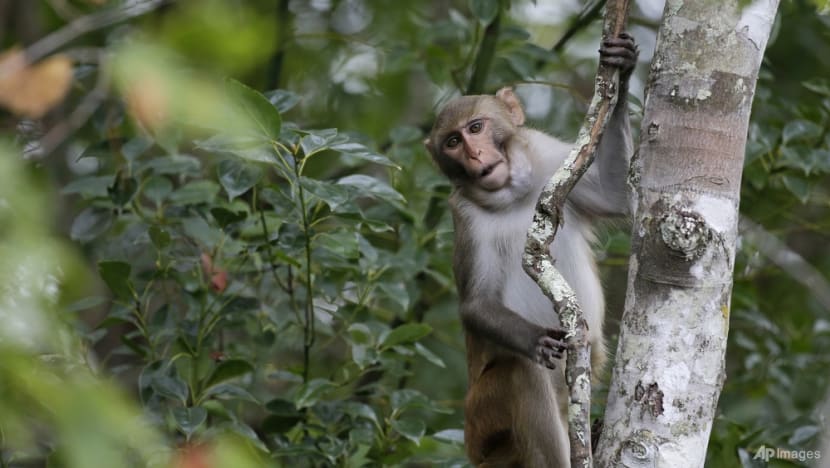Monkeys in Punggol: 50 trapped by NParks in 2024, majority sterilised
"To safeguard public safety, some monkeys that display more aggressive or intrusive behaviour were removed," says Minister for National Development Desmond Lee.

A macaque as seen on Nov 10, 2017. (File photo: AP/John Raoux)

This audio is generated by an AI tool.
SINGAPORE: Fifty monkeys in Punggol were trapped by the National Parks Board (NParks) in 2024 and most of those caught were sterilised as part of efforts to manage the monkey population in the area.
Minister for National Development Desmond Lee said in a written parliamentary answer on Tuesday (Mar 4) that NParks had received several reports of human-monkey conflict and in areas with higher reported cases, the agency intervenes to protect public safety.
This includes long-term population control measures such as sterilisation and the removal of monkeys that display more aggressive or intrusive behaviour, he added.
Mr Lee was responding to parliamentary questions from Associate Prof Jamus Lim (WP-Sengkang). He had asked whether the sterilisation programme, in relation to monkeys in Punggol, is conducted only at specific sites that are confirmed overpopulated, as supported by a study and projected estimates.
Assoc Prof Lim also wanted to know the number of macaques that had been trapped by NParks in 2024 and of those trapped, how many of them were then sterilised and euthanised.
"To manage the monkey population, NParks conducted extensive research and assessment on the population before implementing sterilisation in Punggol," said Mr Lee.
"In 2024, NParks trapped 50 monkeys in the Punggol vicinity, of which the majority were then sterilised. To safeguard public safety, some monkeys that display more aggressive or intrusive behaviour were removed."
This is part of NParks' science- and community-based approach to manage the monkey population in Singapore, which also includes minimising human sources of food by ensuring proper refuse management, feeding enforcement and measures to prevent monkeys from intruding into urban areas.
Mr Lee said that the agency has also been working closely with stakeholders, such as grassroots advisers and the town council, to engage Punggol residents on the mitigation measures and what they should do when encountering monkeys.
"We can all play our part to minimise wildlife intrusions by refraining from feeding wildlife, keeping our residential areas clean and appreciating wildlife from a safe distance," he added.
ISSUE HAS CROPPED UP IN RECENT YEARS
The monkey population in Punggol has caused several issues for residents in recent years.
In 2022, TODAY reported that monkeys would come out of the forested area behind Punggol Waterway and Coney Island to look for food.
They would rummage through bins and damage property, according to residents and shop owners in the area.
The monkeys would also run into shops and supermarkets to steal food, several employees then told TODAY.
According to a Reddit post last month, long-tailed macaques were also found trapped in cages at Punggol Northshore, with one user adding that Telegram community groups had been reporting a lot of monkey sightings of late.
On Feb 5, a post on a Facebook community group for residents of Waterway Sunrise, a Housing Board development in Punggol, detailed NParks’ measures to manage the situation.
It said that in the short term, teams are on-site to guide the monkeys back to forested areas between Punggol Settlement and Waterway Sunrise Estate.
Any monkeys found invading homes will be caught and moved to other areas to prevent further disturbances.
In the long run, some monkeys who are in a "breeding status" will be sterilised as part of efforts to control their population, while ensuring they do not face extinction here, the post added.

















